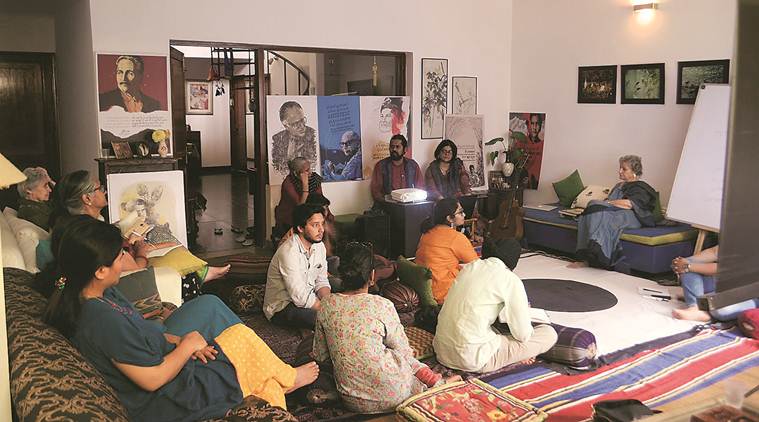
On April 14, as the afternoon began to cool down, Saiyidain Manzil, a private residence near Jamia Millia Islamia, echoed with the words of Faiz Ahmed Faiz and Akbar Allahabadi, set to rock beats. The occasion was the finale of the first of the Saiyidain Manzil Sessions, a collaborative series organised along with the Khwab Tanha collective, which seeks to create an alternative cultural space in the city.
The first session, the Adabi Baithak, was designed as an engagement with the nazms and ghazals of some of the greatest Urdu poets, from Mirza Ghalib to Faiz, Jaun Elia, Noon Meem Rashid and Sahir Ludhianvi. The idea was to reopen the space to the kind of cultural and intellectual exchanges that had once taken place there, says writer and social activist Syeda Hameed, whose family home Saiyidain Manzil is. The house, built in 1968, was the home of public intellectual, educationist and writer Khwaja Ghulam Saiyidain, her father. In those days, a young Hameed saw how it became an adda for artists, writers and intellectuals that her father associated with. “We needed to have a space wherein those kind of conversations could once again happen, not necessarily in the same way, perhaps using new ways to reach new people,” she says.
It wasn’t merely to resurrect the lost world of the ’60s and ’70s that the idea of Saiyidain Manzil Sessions was conceived. Writer and academic Sarover Zaidi who, along with Hameed and Shiraz Husain of Khwab Tanha Collective, conceptualised the sessions, says that while she was intrigued by the anecdotes about the house that Hameed had narrated, she also recognised that it was important to share the knowledge that her collaborators would be bringing in.
“Syeda aapa is an encyclopedia of shayari. Shiraz has also been working, through Khwab Tanha’s posters and postcards, to spread knowledge about Urdu culture, and I’ve also heard him share stories about Urdu poets and writers,” she says. So when a course in Urdu poetry that Hameed was supposed to conduct at India Habitat Centre didn’t work out, Zaidi saw an opportunity to build something new. “I thought we could bring all these resources together and use this house, which has such an important history,” she says.
While the first session engaged with Urdu poetry, Husain says they want to keep the concept open to other kinds of cultural engagements. “So we could have someone giving a talk on art or film screenings,” he says. The important thing is that the sessions are accessible to all. “We understand that there are people who may not know enough about Urdu language and culture, but are nonetheless eager to learn more, and they’re welcome here.”
Given that it’s a private residence that is hosting the sessions, there is a ceiling on the number of people who can be hosted at a time. That also means intimacy and a lack of formality will characterise the sessions. “That’s exactly what we want,” says Hameed.